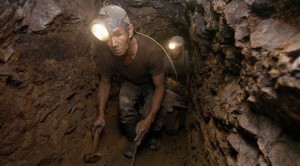PH has 3rd worst mining policy regime

This photo taken on March 26, 2006 shows workers walking through a mine tunnel in Itogon north of Manila. The Philippines said on July 9, 2012, it would not approve new mining permits until Congress passed a bill increasing royalties on the industry as part of new rules governing the sector. AFP FILE PHOTO
The Philippines has the third-worst mining policy regime in the world, better only than those of troubled Venezuela and Kyrgyzstan, according to a study by the Canadian think-tank Fraser Institute.
Results of Fraser Institute’s latest annual survey of mining companies showed that the Philippines ranked 110th out of 112 mining jurisdictions across the globe in terms of the policy environment.
The survey, conducted from Sept. 27 to Dec. 1, 2013, covered the opinions of executives and exploration managers of 690 mining and mining consulting companies.
Based on the survey’s Policy Perception Index (PPI), the country scored 9.5 points out of a possible 100 and the Philippines remained at the bottom 10 ranks.
In the previous survey, the Philippines placed 88th out of 96. Four years ago, in the 2009 survey, the country ranked 70th out of 72—also the third-worst based on the PPI.
Article continues after this advertisementThe rankings included sub-national jurisdictions, with countries like Argentina, Australia, Canada and the United States having multiple jurisdictions.
Article continues after this advertisementThe PPI represents survey responses to questions relating to policy factors that affect investment decisions such as uncertainty concerning the administration of current regulations, environmental regulations, regulatory duplication, the legal system and taxation regime.
Other factors considered were uncertainty concerning protected areas and disputed land claims, infrastructure, socioeconomic and community development conditions, trade barriers, political stability, labor regulations, quality of the geological database, security, and labor and skills availability.
However, based on another index—the Best Practices Mineral Potential Index, which rates geological attractiveness to investors—the Philippines ranked 6th after Alaska (US), Western Australia, Nevada (US), Chile and British Columbia (Canada).
Fraser Institute said “best practices” refer to concepts like a world-class regulatory environment, highly competitive taxation, no political risk or uncertainty, and a fully stable mining regime.
“In other words, respondents were asked to rate the attractiveness of the (jurisdiction’s) ‘pure’ mineral potential independent of any policy restrictions,” the think-tank explained in its 134-page report.
Considering both indices, Fraser Institute placed the Philippines at 61st out of 112 in the Investment Attractiveness Index (IAI) with 51.4 points out of a possible 100. In the previous survey, the Philippines ranked 55th out of 96 in the IAI.
“They (in the Philippines) throw arbitrary conditions into licenses on a take-it-or-leave-it basis,” the institute anonymously quoted an exploration company’s senior management official.